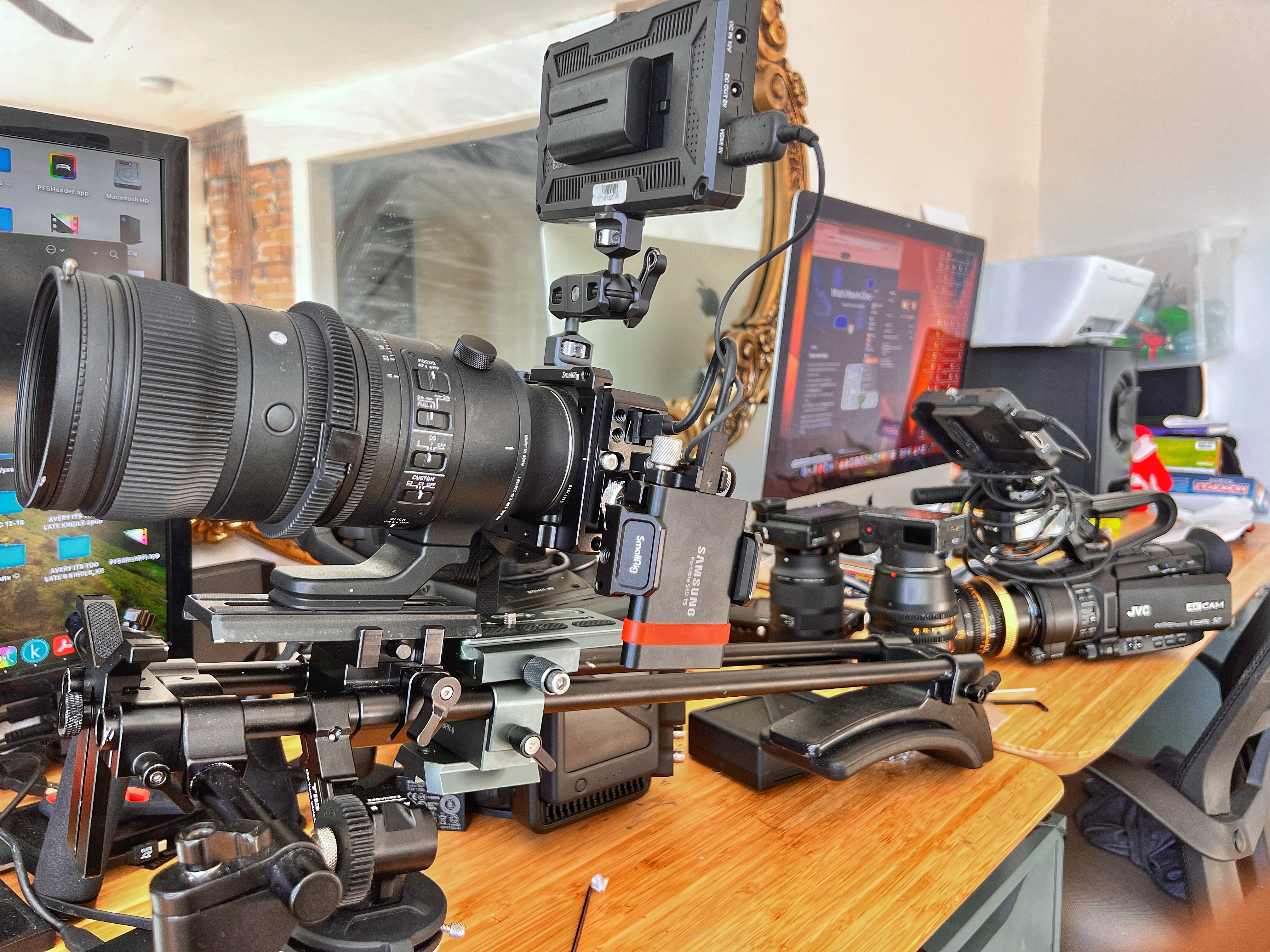-
Posts
245 -
Joined
-
Last visited
About Alt Shoo

Profile Information
-
Gender
Male
-
Location
NYC
-
Interests
Filming.
-
My cameras and kit
Sony FX3, Sigma fp & fpL, Panasonic EVA1, JVC GYLS300, 2x ZCam E1, Sony a6300, Sony NEX-7, DJI Osmo Pocket and other various creative support tools.
Contact Methods
-
Website URL
Theindustrylabs.com
-
Instagram
@industrylabs
Alt Shoo's Achievements

Active member (3/5)
180
Reputation
-
Alt Shoo started following Panasonic Lumix S1R Mark II coming soon , I ~LOVE~ the new snow white movie , New Bond producers for Amazon and 5 others
-
The effects in the movie looks good, but for this film and many recreated versions, it’s too overboard, which gives it a creepy feel. Also I prefer if they keep the characters the same instead of pandering to the masses. These remakes must be making some good ROI because Disney keeps churning them out despite what critics are saying. At this point the only retreat from this is supporting well made indie films.
-
Hoping they will continue pushing the franchise forward, but realizing the movies they’ve been involved with, the confidence level is low.
-
 IronFilm reacted to a post in a topic:
Movies looked better before "color grading" was invented. Let's return to proper film-making.
IronFilm reacted to a post in a topic:
Movies looked better before "color grading" was invented. Let's return to proper film-making.
-
 Ninpo33 reacted to a post in a topic:
Panasonic Lumix S1R Mark II coming soon
Ninpo33 reacted to a post in a topic:
Panasonic Lumix S1R Mark II coming soon
-
 92F reacted to a post in a topic:
Panasonic Lumix S1R Mark II coming soon
92F reacted to a post in a topic:
Panasonic Lumix S1R Mark II coming soon
-
I prefer going to the theater when it’s empty. A packed house usually means dealing with loud personal conversations, whining kids, and other distractions. It takes away from actually enjoying the movie. That said, the last time I truly enjoyed a packed theater experience was True Lies. But to be fair, I was a little inebriated… and I was probably the one disturbing the movie. lol
-
Got it, I see what you’re saying about the DP shooting for the edit rather than fixing things in post. That’s a solid approach when you know exactly what you need, and I respect that. As for pros not talking about gear, I’m not saying they never do. Of course, people in the industry test and discuss new tech, but the difference is that those conversations usually focus on how the gear serves the work, not endless debates over minor details that don’t make or break a project. I don’t have an issue with people being passionate about cameras, I just think the discussion gets lost when it’s more about obsessing over specs than actually applying them to real world filmmaking.
-
 Juank reacted to a post in a topic:
Panasonic Lumix S1R Mark II coming soon
Juank reacted to a post in a topic:
Panasonic Lumix S1R Mark II coming soon
-
 Davide DB reacted to a post in a topic:
Adolescence on Netflix: Technique & Creativity
Davide DB reacted to a post in a topic:
Adolescence on Netflix: Technique & Creativity
-
I’m going to check this out. Thanks for sharing this.
-
 Alt Shoo reacted to a post in a topic:
Adolescence on Netflix: Technique & Creativity
Alt Shoo reacted to a post in a topic:
Adolescence on Netflix: Technique & Creativity
-
 mtol reacted to a post in a topic:
Where Are the Discussions on Creative Filmmaking Techniques?
mtol reacted to a post in a topic:
Where Are the Discussions on Creative Filmmaking Techniques?
-
 mtol reacted to a post in a topic:
Panasonic Lumix S1R Mark II coming soon
mtol reacted to a post in a topic:
Panasonic Lumix S1R Mark II coming soon
-
 Alt Shoo reacted to a post in a topic:
Where Are the Discussions on Creative Filmmaking Techniques?
Alt Shoo reacted to a post in a topic:
Where Are the Discussions on Creative Filmmaking Techniques?
-
 ac6000cw reacted to a post in a topic:
Panasonic Lumix S1R Mark II coming soon
ac6000cw reacted to a post in a topic:
Panasonic Lumix S1R Mark II coming soon
-
I get where you’re coming from, and I understand that different workflows exist for different reasons. But at some point, you have to ask, are we pushing our tools to be better storytellers, or just finding ways to avoid tightening up our craft? There’s a difference between efficiency and just being lazy. If someone is taking multiple takes to get it right, that’s not always inexperience. It’s making sure the shot actually works without needing to “fix it in post.” On the other hand, the mindset of shooting carelessly and relying on post production isn’t efficiency, it’s a crutch. Regarding not using older gear, some people don’t use those older cameras simply because they want to make their job easier. Newer cameras offer better usability, faster workflows, etc. but still, as everyone allegedly already knows, you can still achieve a high quality look with older gear. It just comes down to experience and knowing how to work with what you have. At the end of the day, I don’t see top level professionals getting caught up in these debates. They pick their tools, use the features that matter, and get the job done. Ninpo33 mentioned a DP who didn’t realize a camera had a particular function…because that DP focused on what helped him execute, not on obsessing over every technical option. That’s the difference between using your gear and getting lost in it.
-
 Ninpo33 reacted to a post in a topic:
Movies looked better before "color grading" was invented. Let's return to proper film-making.
Ninpo33 reacted to a post in a topic:
Movies looked better before "color grading" was invented. Let's return to proper film-making.
-
I tried numerous times to search for these shared experiences before posting this thread. Maybe a sub forum to find these ideas faster? Can you share a few that’s posted here?
-
 ac6000cw reacted to a post in a topic:
Panasonic Lumix S1R Mark II coming soon
ac6000cw reacted to a post in a topic:
Panasonic Lumix S1R Mark II coming soon
-
There are moments here I enjoy but this forum feels more like a place to vent about gear than to actually discuss the craft of filmmaking. Where are the conversations on creative problem solving? How are people pulling off run and gun shooting in restricted areas without permits? What are some cost-effective practical effects techniques for horror films? Are certain shot compositions or camera movements more effective at evoking specific emotions in an audience? I know I can find some of this on YouTube, but part of the appeal of a forum like this is the ability to connect directly with professionals, exchange real world experiences, and even spark collaborations. Is anyone still having these kinds of discussions here?
-
This take is a bit much. Plenty of bad films were shot on film, and plenty of great ones were shot digitally. It’s not the format that makes a movie good or bad it’s how you use it. Preferring film is fine, but saying digital ruined cinema is extreme. That said, I’m interested in Fuji’s upcoming Eterna film camera. If it delivers high quality in camera color, it could push DPs to lock in the final look while shooting, which is an interesting approach.
-
I get that people love to dissect every little thing, but as someone working with some of the biggest media companies, I can tell you that a lot of these so called issues don’t even come up in real world professional work. The S1R II delivers solid image quality, stabilization, and dynamic range. More than enough to create high level content. I’m not saying don’t analyze your tools, but at some point, you have to ask, is this actually making you a better filmmaker, or just keeping you stuck in analysis paralysis? If your priority is making great content, you’ll be just fine.
-
 Alt Shoo reacted to a post in a topic:
Movies looked better before "color grading" was invented. Let's return to proper film-making.
Alt Shoo reacted to a post in a topic:
Movies looked better before "color grading" was invented. Let's return to proper film-making.
-
 Alt Shoo reacted to a post in a topic:
Movies looked better before "color grading" was invented. Let's return to proper film-making.
Alt Shoo reacted to a post in a topic:
Movies looked better before "color grading" was invented. Let's return to proper film-making.
-
Looks interesting. Will check it out. Thanks for sharing.
-
 Alt Shoo reacted to a post in a topic:
Panasonic Lumix S1R Mark II coming soon
Alt Shoo reacted to a post in a topic:
Panasonic Lumix S1R Mark II coming soon
-
Hey, genuinely curious since your current system meets your needs, what’s the real motivation behind all the trade talk? Is it the thrill of the chase? The hope that the next camera will finally make your coffee and take the shots for you? Or do you just enjoy keeping your local camera shop in business? No judgment, just trying to understand the mindset!
-
Why not just buy it without trading or selling anything? You will still have the cameras that met your needs and then another tool you can warm up to.
-
@IronFilm again, I appreciate you reading the post, but the purpose of this piece was never to be a comprehensive history lesson. It was about exploring developments and ideas, not rehashing what everyone already knows about cameras like the GH4. The Sharp 8K prototype was included as an example of experimentation within the MFT space, even if it wasn’t a commercial success. Honestly, y’all need to stop pixel peeping everything and focus on the bigger picture. Innovation and what’s next for MFT, which is exactly what this post is about.
-
 Alt Shoo reacted to a post in a topic:
What is Lumix thinking?!
Alt Shoo reacted to a post in a topic:
What is Lumix thinking?!
-
 Alt Shoo reacted to a post in a topic:
Blackmagic Pocket Cinema Camera 4K
Alt Shoo reacted to a post in a topic:
Blackmagic Pocket Cinema Camera 4K
-
I appreciate your response. This particular post was intentionally more focused on current events and recent developments within the MFT ecosystem, rather than being a comprehensive historical overview.That said, I’m actually working on something that dives deeper into the history of the MFT standard, covering key milestones and contributions from cameras like the GH series, BMPCC, Kinefinity, and others. It’s designed to appeal to those who appreciate the depth and nuance of the system’s evolution.



